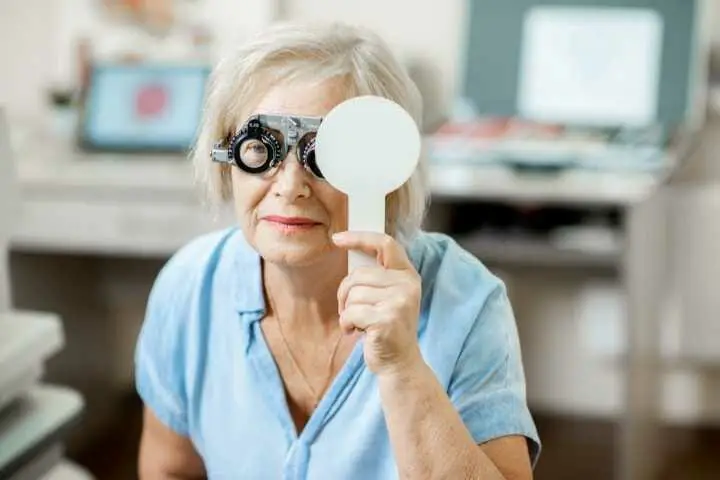Loss of vision is a very common problem in old age. Our guide to managing vision problems in old age covers the most important vision-related diseases, symptoms, details about the surgery, and a word on future technologies that address this problem
Contents
Vision problems are one of the most common concerns in older adults. Our senses (including vision) gradually deteriorate as our bodies age, and most major eye diseases are age-related. These vision-related problems are usually seen in people over the age of 60, and above. Here are some world estimates on eye-related problems:
- Worldwide nearly 285 mn have impaired vision, out of which 40 mn are blind or have very poor vision.
- 65% of those visually impaired and 82% of the blind are above 50 years of age.

When Do Vision Problems Start In The Elderly?
Eyesight issues typically begin during the onset of or during the mid-’40s. Most older adults find it difficult to view clearly at a close range, usually while reading books or operating laptops or phones.
This is the most common issue adults face during the age of 40 to 60 years. This change in your vision, (loss of near focusing ability) also called Presbyopia, continues to increase with time.
At the beginning stage, people usually prefer keeping reading material farther away from their eyes to view things. Or you may even need to take off your glasses to get a better view. Most people find it difficult to read a newspaper or a menu, or it appears blurry in dim light.
People aged 40 or above suffer from the following health issues and are more prone to develop vision issues such as :
- People who suffer from chronic, systemic conditions such as diabetes or high blood pressure.
- People who have a family history of Glaucoma or macular degeneration.
- People who have a highly demanding job or work in an eye-hazardous occupation. Like most working on computers or working in a glass bangle industry.
- People suffering from problems like high cholesterol, thyroid, anxiety or depression, and arthritis, for which you are generally on medication.
Glaucoma And Its Causes
Glaucoma is one of the biggest causes of blindness and is most prevalent in people above 60 years. But this problem can be cured or prevented if you recognize it and get its treatment done early.
Causes of Glaucoma
Normally, your eyes generate aqueous humor regularly. When the fresh aqueous flows in your eye, almost an equal amount of it should drain out as well. The aqueous humor comes out through an area known as the trabecular mesh work at the drainage angle. The process keeps the pressure in the eyes (called intraocular pressure or IOP) stable.
The optic nerve consists of many nerves, nearly a million. If these nerve fibers become unresponsive/damaged, you might develop blind spots in your eyesight. The pressure inside the eye increases either due to overproduction of the fluid and/or if it is not drained out effectively, which may further damage the optic nerve.

You may not be able to notice these blind spots unless a significant portion of your optic nerve has died. And if, in any case, all these nerve fibers become unresponsive, then you will eventually lose your eyesight. Therefore, you should take precautions regularly and get a regular eye check-up if you are 60 years of age or above it.
For a surgeon to know whether you have Glaucoma or not, he will do the following-
- He will evaluate whether there is damage of the optic nerve (Dilated eye exam; Imaging tests; Inspect the drainage angle (gonioscopy))
- He would even calculate the eye pressure (tonometry) and will test the visual area (visual field test).
At times people may feel some damage to the eye due to Glaucoma even though there is normal pressure in the eye (Normal-tension glaucoma). It is treated by prescribing eye drops, laser surgery, or medicines.
Symptoms Associated With Glaucoma May Include:
- Seeing halos around lights.
- Blurred vision/loss of vision.
- Redness in your eye.
- The eye that looks a bit hazy (particularly in infants)
- Upset stomach or regular vomiting.
- Experiencing frequent pain in the eyes.
Problems Faced Due To Vision Issues
As you age, you start facing many health-related issues, and you even experience a change in your body shape and size. Similarly, you might notice changes in your eyes or vision with time. The following are some age-related vision issues:
Demand For More Light
As you age, you need more light to see than when you previously saw things. People mostly prefer working on their chair and table or next to their reading chair with brighter lights to read and do other tasks more easily.
You would find it difficult to read something or do work that requires you to view things more closely. With time, the lens in your eye becomes less flexible; therefore, the text you read or see starts appearing blurry, especially the printed material.
It makes it even more difficult for your eyes to focus on near objects than when you used to be younger.

People Sometimes Find It Difficult To Wear Glasses
While driving any vehicle, whether it is a car or a bike, you might find it challenging to drive as you may notice some extra glare during morning or night hours from the headlight, or sunlight reflecting off pavements or windshields in the daytime.
This is due to a change in the lens of your eyes because when the light enters, it becomes scattered rather than being focused on the retina. This creates more glare. Age-related changes in the lens also bring about changes in color perception.
The usually clear lens placed in your eyes may start to discolor. This eventually affects it by making it difficult to view and differentiate between various color shades, and aging also impacts the production of tears by tear glands causing reduced tear production.
Warning Signs Of Eye Health Problems You Must Keep In Mind
When you start aging, it is not only necessary to eat good food and take your medicines on time, but this is also the time in life when your risk for developing several eye and vision problems rises. The following are the symptoms that could be the early warning signs of a severe vision health problem:
Blurry Vision
Problems like Cataract, Macular degeneration, or Uveitis may cause a severe problem and blur the vision. It can even worsen the eye condition and lead to a permanent loss of eyesight.
Lights Flashing
Unexpected flashes of light are a sign of a retinal tear which can even cause retinal detachment.

Red Growth Overlapping the Eyes
If you notice a triangular growth beginning from the nasal corner of the eye and covering the black part of the eye, it is generally an indication of pterygium formation, also known as an abnormal fibrous growth of the conjunctiva. This is removed by surgery to make your eye feel comfortable.
Puffy or Swollen Eyes
You might experience puffiness in the eyes due to any allergy or inflammation or any other infectious issue that might be the cause behind it. It can also be due to thyroid issues.
Teary Eyes
Tears usually keep our eyes moist and even clear the dirty particles. If by any chance you have an infection, or you scrape your eyes, or if you have blocked tear ducts, then you will experience watery eyes. You should consult an ophthalmologist if you feel any pain in your eyes or affect your eyesight.
What To Expect From Cataract Surgery
A person is said to have cataracts if their vision has become blurry and foggy with time. Also, old age is an important reason behind cataracts. If the person is 60 years or above, there is a good chance that they may have cataracts. Your doctor can easily treat it as it is a common elderly issue.
Symptoms Associated With Cataracts:
- Your Vision becomes blurry, foggy, or cloudy
- Older people generally experience Nearsightedness issue
- Facing difficulty in driving at night due to glare from headlights
- Increasing problems with night vision
- Experiencing Double vision in the area of the eye that got affected
- Facing problems with specs or contact lenses
What Is the Procedure of Cataract Surgery?
Cataract surgery is done by using different methods, but all of these surgeries have a common thing: the doctor removes the foggy lens from the eyes and puts back the artificial lens.
You may become restless just by thinking about eye surgery. But this procedure has become quite normal nowadays.

The doctor gives the person local anesthesia, which is used to numb your eyes, and you will be awake during the process and would hardly feel like anything is being replaced in your eye. There are three ways a cataract surgery can be performed such as:
- Incision surgery- Small: This surgery is also known as phacoemulsification. The surgeon makes a small slash on the cornea. Then they insert a tiny device in the eye which transmits the ultrasonic waves that eventually break /emulsify your foggy lens. Later, the surgeon removes the particles from the eye and inserts the artificial lens in your eye.
- Incision surgery- Large: Doctors mostly prefer not to recommend this surgery, but it is performed when people have large cataracts or eye complications, making it more difficult for them to see things than usual. It is even known as extracapsular cataract extraction. The surgeon removes your foggy lens in a single piece and replaces it with the artificial one. People generally require many days to recover through the surgery compared to small-incision types.
- Femtosecond laser surgery: In this surgery, the surgeon usually uses the laser to make an incision and softens the cataract which may require less energy for emulsifying the lens of your eye, and he then puts in a new lens, as in the case of other surgeries. The surgeon might ask you to opt for this procedure if you even have astigmatism, i.e., a curve of your cornea or front part of the eyeball is not round that makes your vision blurry. The surgeon can even treat this problem when cataract surgery is in the process just by using a laser to reshape the cornea.
How Long Does Cataract Surgery Last?
The surgery gets done in nearly half an hour, and it is not required to stay in the hospital for the whole day. If you find cataracts in both your eyes, then the doctor does not perform surgery on the second eye until the first one is healed properly.
Outcomes of the Cataract Surgery
95% of people who have undergone this surgery have experienced a much clearer view of things afterward and even find it more comfortable than they used to be earlier.
Most people do not face any issues during the recovery as it is a smooth process. How much vision recovers is based on what type of surgery you have undergone. But in general, you’ll notice that your vision gets much better a few days after the surgery happens.

Are There Any Post Surgery Complications?
Though all surgery has some risks involved in it, the chances are quite low that you might face bleeding or even an infection. There might be a rare chance that your retina could pull away from the tissues at the back of your eye, and it is known as a detached retina.
After cataract surgery, some people face an issue called posterior capsule opacification (PCO). Your vision might become foggy again after months or years because the capsule in the eye which keeps the artificial lens at a point becomes thicker. Laser surgery, known as YAG, can also help overcome this issue.
The Future of Vision For Seniors
Vision loss is an age related phenomenon, which means the scope for treatment is limited, even though several advancements are being made in the field.
In terms of technology, there is a lot of innovation happening in terms of assistive devices. Tabs and screen reading devices that support braille through touch sensory mechanisms, screen magnifiers for vision impairment, and watches and printers that support braille are just some of the new ideas that are coming out in the future for those who lose their sight.
New technologies in terms of smart home gadgets which are voice commands operated through a central controlling device like Alexa or Google Home are offering new hope for those who are confined to a home with blindness and find it difficult to perform their daily activities.

Wrapping Up!
Aging is a part of life, and keeping yourself fit is also an essential duty one needs to follow. But along with all these things, people, especially the elderly, forget to take care of their eyes and undergo different surgeries or other alternatives already mentioned above.
We hope that our guide has been able to answer most of your important queries about vision impairment and other vision related problems in old age. Do let us know if there are queries that you would like us to answer, and please share the article with others who might be looking for similar content.
